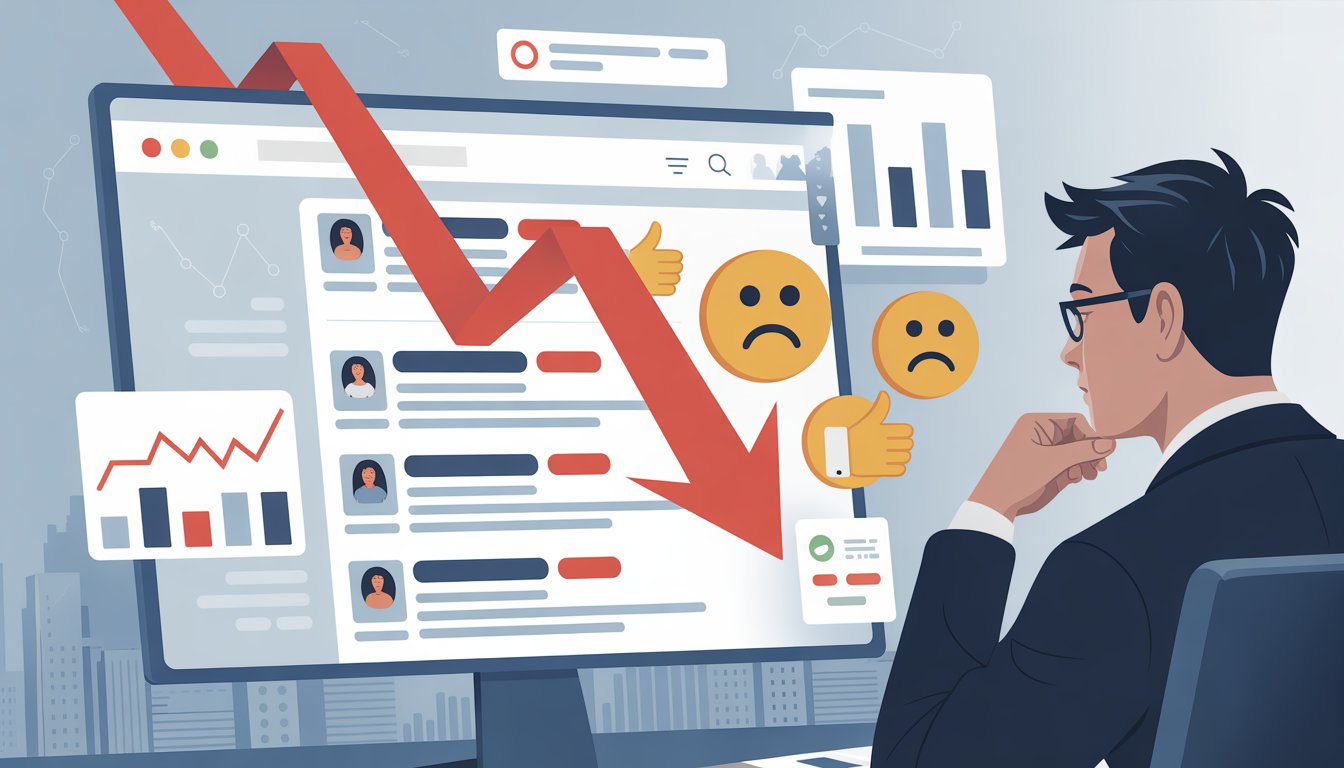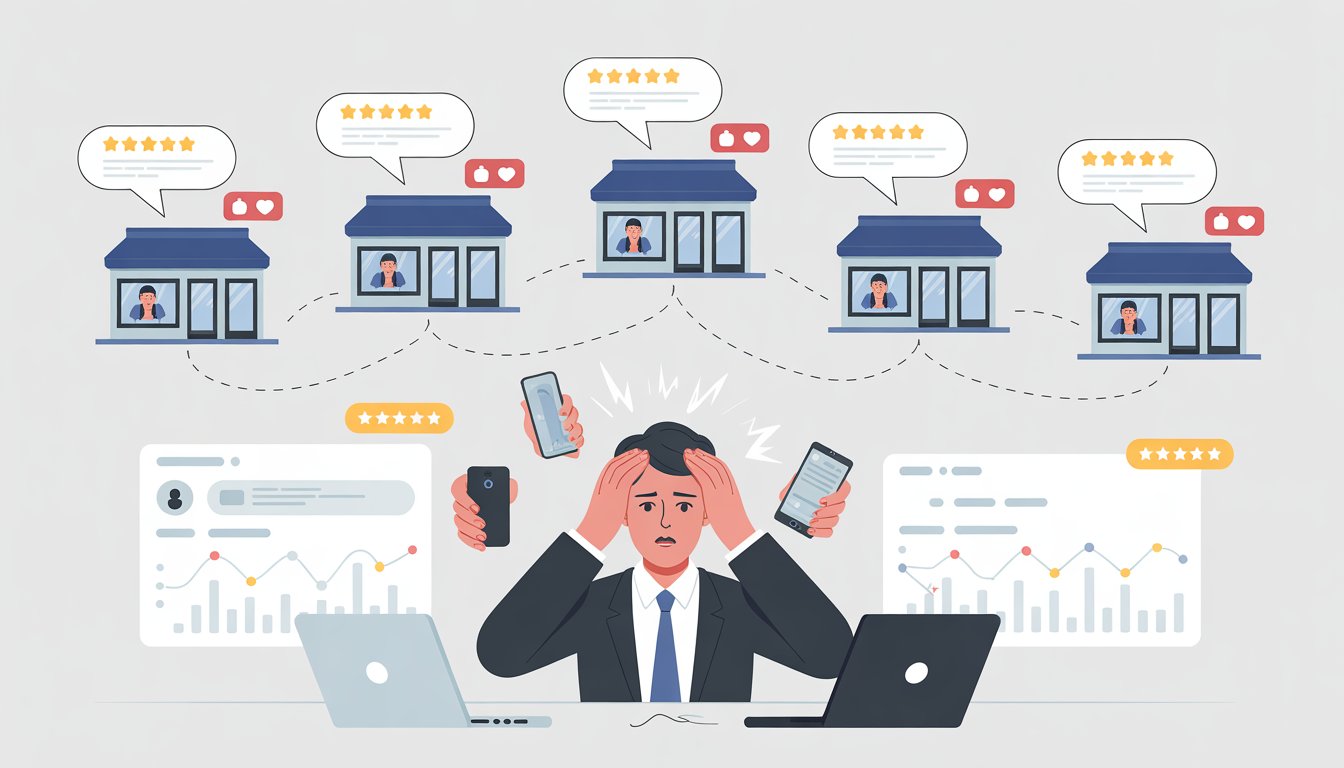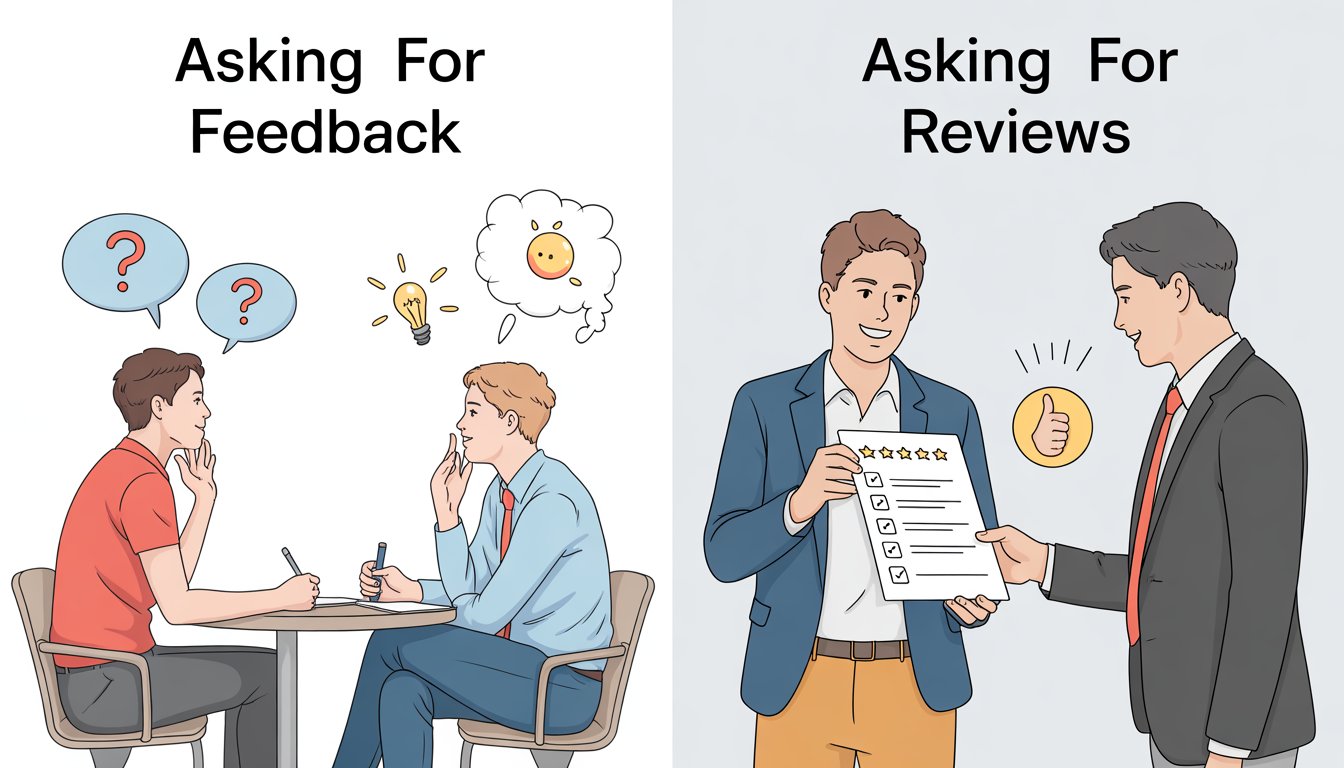Negative reviews can hurt your search rankings, but not in the way most business owners think. While Google doesn't directly penalize your website for bad reviews, these reviews create a chain reaction that impacts your visibility online.
Negative reviews reduce your click-through rates, lower customer trust, and decrease engagement signals that search engines use to determine your ranking position.

The impact goes beyond just Google's main search results. Local search rankings get hit harder when negative reviews pile up.
Search engines look at your overall rating and review patterns to decide where you appear in local map results and business listings. Your online reputation affects how people interact with your business online.
When potential customers see bad reviews, they're less likely to visit your website or contact you. This drops your traffic and engagement, which tells search engines that your business might not be as relevant or trustworthy as competitors with better reviews.
Key Takeaways
- Negative reviews indirectly hurt search rankings by reducing click-through rates and customer engagement
- Local search results are more affected by bad reviews than general web search rankings
- Poor online reputation leads to less website traffic and lower engagement signals to search engines
Understanding the Impact of Negative Reviews on Search Rankings

Negative reviews affect your search rankings through complex algorithms that consider both direct signals and broader patterns. Google's position has evolved since 2010, with current algorithms focusing on overwhelming negative sentiment rather than individual bad reviews.
Direct Effects Versus Indirect Effects
Negative reviews impact your rankings through two main pathways. Direct effects occur when search engines analyze review content and ratings as ranking signals.
Google considers reviews a key local search ranking factor. When you lose positive reviews or gain many negative ones, your average star rating drops.
This directly affects your visibility in local search results. Indirect effects happen through user behavior changes.
Negative reviews reduce your click-through rates from search results. People skip businesses with low ratings.
Lower click-through rates signal to Google that users don't find your business relevant. This creates a cycle where poor reviews lead to fewer clicks, which then hurts your SEO rankings further.
Your website traffic decreases when negative reviews pile up. Search engines notice this pattern and may lower your rankings accordingly.
Google's Official Position on Negative Reviews
Google's John Mueller clarifies that a few negative reviews won't hurt your search rankings. The search giant expects normal businesses to have some unhappy customers.
Google only acts when signals are overwhelmingly negative. Mueller states that if "all of the signals point in that direction," Google's algorithms might pick up on it.
A handful of upset customers writing random negative things online won't impact your rankings. Google's systems recognize this as normal business activity.
However, situations where "a lot of people are really upset about your site" are rare. Mueller notes these extreme cases don't affect most normal websites.
Strong negative signals are required before Google applies ranking penalties. The algorithms need clear, trustworthy evidence of serious problems with your business.
Sentiment Analysis in Search Algorithms
Google introduced sentiment analysis in 2010 to turn negative comments into negative ranking votes. The original algorithm has changed significantly over the past 15 years.
Current sentiment analysis faces several challenges:
- Reviewers often have personal biases or agendas
- Review quality varies greatly across different platforms
- Star ratings mean different things to different people
- Fake or untrustworthy reviews create noise in the data
Google's algorithms must filter through this "noisy" review data. They look for patterns from trusted sources rather than individual complaints.
Negative reviews from local guides with detailed content, keywords, and photos can rank higher in search results. These carry more weight than brief, anonymous complaints.
Modern sentiment analysis requires overwhelming negative signals from trustworthy sources. Random bad reviews get filtered out as normal business noise that doesn't reflect true service quality.
Online Reviews and Their Influence on SEO

Online reviews directly impact how search engines rank your website in search results. The number of reviews you have and their star ratings send strong signals to Google about your business quality and customer satisfaction.
Relevance of Review Quantity and Quality
Search engines use review quantity as a trust signal for your business. More reviews show that customers actively engage with your company.
Quality matters more than quantity alone. Google's algorithms analyze the content of reviews to understand customer experiences.
Reviews with specific details about your products or services carry more weight than short, vague comments. Fresh reviews help your SEO rankings more than old ones.
Search engines favor businesses that consistently receive new customer feedback over time. Review diversity strengthens your online presence.
Having reviews across multiple platforms like Google My Business, Yelp, and industry-specific sites creates a stronger SEO foundation. The star rating average affects how search engines view your business credibility.
Businesses with ratings above 4 stars typically perform better in search results than those with lower ratings.
How Review Ratings Affect Local SEO
Local SEO rankings depend heavily on your Google My Business review profile. Businesses with higher star ratings appear more often in the local map pack.
The local map pack shows only three businesses for most searches. Your review rating helps determine if you make this important list.
Google uses review signals to match businesses with search intent. If customers mention specific services in reviews, your business may rank better for those related keywords.
Review frequency impacts local visibility. Getting new reviews regularly signals to Google that your business stays active and relevant to customers.
Negative reviews can push your business out of prime local search positions. This effect is stronger for businesses with fewer total reviews.
Role of Online Reputation in Search Rankings
Your overall online reputation affects how search engines evaluate your website authority. Poor reputation signals can lower your rankings across all search results.
Search engines track sentiment patterns in reviews. A sudden increase in negative reviews can trigger algorithm changes that hurt your SEO performance.
Review responses show search engines that you care about customer service. Businesses that respond to reviews often rank better than those that ignore customer feedback.
Reputation management becomes part of SEO strategy. Monitoring and improving your review profile directly supports your search ranking goals.
Cross-platform reputation consistency matters to search algorithms. Having similar ratings across different review sites strengthens your overall SEO position.
How Negative Reviews Affect Local Search
Negative reviews directly impact your local search rankings by affecting your business's trustworthiness signals and visibility in Google's algorithm. Poor reviews lower your star ratings and can reduce click-through rates, while unaddressed complaints signal poor customer service to search engines.
Google My Business and Review Management
Your Google My Business profile serves as the foundation for local search visibility. When negative reviews appear on your listing, they immediately affect your average star rating.
Google uses reviews as trust signals when determining local rankings. A business with mostly negative reviews will rank lower than competitors with positive feedback.
This happens because Google wants to show users the most reliable local options. Review volume also matters for rankings:
- More reviews generally improve visibility
- Recent reviews carry more weight than old ones
- Review frequency shows business activity
Your star rating appears in search results. Most customers avoid businesses with ratings below 3.5 stars.
This creates a cycle where poor ratings lead to fewer clicks, which signals to Google that users don't find your business relevant. Managing your online reputation becomes critical for maintaining local search performance.
Monitor your Google My Business reviews daily and track changes in your average rating.
The Importance of Responding to Reviews
Responding to negative reviews shows Google and potential customers that you care about customer service. Search engines view response rates as a sign of an active, engaged business.
Quick response times matter most:
- Respond within 24-48 hours when possible
- Address specific concerns mentioned in reviews
- Keep responses professional and helpful
When you respond to reviews, you create additional content on your Google My Business profile. This content can include relevant keywords that help with local search rankings.
Your responses also show up in search results alongside the original review. Unaddressed negative reviews send signals about poor customer service.
Google may interpret this as a sign that your business provides a bad user experience. This can hurt your local rankings over time.
Response quality affects customer perceptions too. A thoughtful response to criticism can actually improve your reputation.
Many customers read business responses before making decisions about where to shop or dine.
Impact on Local Search Visibility
Negative reviews reduce your click-through rates from local search results. When your business appears in the local pack or map results, users see your star rating immediately.
Lower star ratings mean fewer people click on your listing. Google tracks these click-through rates and uses them as ranking signals.
Businesses that get fewer clicks will gradually lose visibility in local searches. Key visibility factors affected by negative reviews:
- Local pack rankings drop
- Map search positioning declines
- Featured snippet appearances decrease
Your local search traffic will decrease as rankings fall. This creates lost revenue opportunities since many customers never scroll past the first few local results.
Negative reviews also affect your business's appearance in voice searches. Smart speakers and voice assistants prioritize highly-rated local businesses when answering location-based questions.
The impact grows stronger over time if negative reviews accumulate without positive ones to balance them out. Regular monitoring and reputation management become essential for maintaining local search performance.
Reputation Management Strategies for Negative Reviews
Managing negative reviews requires a proactive approach that combines careful monitoring with strategic responses. The key is to address problems quickly while building a stronger foundation of positive feedback.
Monitoring and Addressing Negative Feedback
Set up alerts to catch negative reviews as they appear online. Use Google Alerts, social media monitoring tools, or reputation management platforms to track mentions of your business name.
Check review sites like Google My Business, Yelp, and Facebook regularly. Most platforms send email notifications when new reviews are posted.
Monitor these key places:
- Google My Business
- Yelp and TripAdvisor
- Facebook and Instagram
- Industry-specific review sites
- Better Business Bureau
Respond to negative feedback within 24-48 hours when possible. Quick responses show you care about customer concerns and are actively managing your online reputation.
Document patterns in negative reviews. If multiple customers mention the same issue, it points to a real problem that needs fixing.
Best Practices for Replying to Negative Reviews
Always respond professionally and avoid getting defensive. Thank the reviewer for their feedback, even when the review feels unfair.
Address the specific issues mentioned in the review. Show that you read and understood their concerns.
Follow this response structure:
- Apologize for their poor experience
- Acknowledge the specific problem
- Explain what you're doing to fix it
- Invite them to contact you directly
Keep responses brief but personal. Avoid copy-and-paste replies that sound robotic.
Take heated discussions offline quickly. Provide a phone number or email where they can reach you privately.
Never argue with reviewers publicly. This makes your business look unprofessional and can hurt your online reputation more than the original negative review.
Encouraging Positive Reviews to Offset Negativity
Ask satisfied customers to leave reviews while their experience is fresh. Send follow-up emails after purchases or completed services.
Make leaving reviews easy by providing direct links to your review profiles. Include these links in emails, on receipts, and on your website.
Timing matters for review requests:
- Within 24 hours of purchase
- After successful service completion
- When customers express satisfaction
Train your staff to mention reviews during positive interactions. A simple "We'd love a review if you're happy with our service" works well.
Offer small incentives like discounts on future purchases, but check platform rules first. Some review sites don't allow incentivized reviews.
Focus on providing excellent service consistently. Happy customers naturally leave positive reviews without being asked.
Create multiple touchpoints for review requests across different channels, but don't overwhelm customers with too many requests.
Third-Party Review Platforms and Their SEO Impact
Reviews on platforms like Yelp and TripAdvisor affect your search rankings through direct visibility in search results and indirect influence on your overall online reputation signals. These platforms often rank high for business-related searches and can display rich snippets with star ratings directly in Google's search results.
Reviews on Yelp and Other Major Platforms
Yelp reviews carry significant weight in local search rankings. When customers search for businesses, Yelp pages often appear on the first page of search results.
Your Yelp rating becomes a ranking factor for your business. Search engines view high ratings as trust signals.
Low ratings can hurt your visibility. Other major platforms include:
- TripAdvisor for hotels and restaurants
- Amazon for product reviews
- Facebook for local businesses
- Better Business Bureau for service companies
These platforms build domain authority over time. Their pages rank well because they receive millions of visits monthly.
When your business has positive reviews on these sites, you benefit from their strong search presence. Negative reviews on these platforms can harm your rankings in two ways.
First, they lower your average rating score. Second, they create negative content that appears when people search for your business name.
How Third-Party Ratings Appear in Search Results
Search engines display third-party ratings as rich snippets in search results. You might see star ratings next to business listings from Yelp, Google Reviews, or other platforms.
These rich snippets catch users' attention immediately. Businesses with 4-5 star ratings get more clicks than those with lower ratings or no visible ratings.
Common rich snippet elements include:
- Star ratings (1-5 stars)
- Review count numbers
- Platform name (Yelp, TripAdvisor, etc.)
- Review excerpts or summaries
The review count matters as much as the rating itself. A business with 100+ reviews at 4.2 stars often outperforms one with 5 reviews at 4.8 stars.
Search engines pull this data automatically from structured markup on review sites. You cannot directly control which ratings appear, but you can influence them by encouraging reviews on major platforms.
Multiple platform ratings can appear for the same business. This gives you several chances to show positive ratings in search results.
Negative Reviews, Backlinks, and Link Building
Negative reviews can directly impact your website's ability to earn quality backlinks. Poor review sentiment makes other websites less likely to link to your business and can damage your site's authority.
Do Negative Reviews Affect Backlink Quality?
Negative reviews create trust issues that directly impact your backlink profile. When your business has poor reviews, reputable websites become hesitant to link to you.
Quality sites avoid linking to businesses with negative reputations. Publishers and bloggers check your online reputation before featuring your content or services.
They don't want to risk their own credibility by associating with poorly reviewed businesses. Your domain authority suffers when you receive fewer high-quality backlinks.
Search engines use backlinks as trust signals. When trusted sites stop linking to you, your rankings drop.
Bad reviews also affect the types of backlinks you earn:
- Fewer editorial links from news sites and blogs
- Reduced partnership opportunities with other businesses
- Lower quality referral links from industry resources
- Decreased social media mentions and shares
Relationship Between Review Sentiment and Link Earning
Positive review sentiment drives natural link building opportunities. Websites with strong reputations earn more organic backlinks without active outreach efforts.
Good reviews create content opportunities. Success stories and positive customer experiences become linkable content.
Other sites reference and link to businesses with strong customer satisfaction. Your link earning potential increases with better reviews:
Review RatingLink Earning Potential4.5-5 starsHigh organic links3.5-4.4 starsModerate linksBelow 3.5Very few quality links
Negative sentiment creates the opposite effect. Poor reviews make your site less attractive for link building campaigns and reduce your ability to earn natural editorial links.
Frequently Asked Questions
Negative reviews create complex effects on search rankings that depend on volume, source quality, and overall review patterns. The impact varies significantly between local SEO factors and general website rankings.
Can poor online reviews lead to a decrease in search visibility?
Poor reviews can decrease your search visibility, but only under specific conditions. Google's algorithms may lower your rankings when you receive an overwhelming amount of negative feedback from trusted sources.
A few bad reviews mixed with positive ones won't hurt your rankings. Google expects some negative feedback as part of regular business operations.
The decrease in visibility happens more through reduced click-through rates than direct ranking penalties. Users often skip businesses with low star ratings in search results.
What role do customer ratings play in local search engine optimization?
Customer ratings serve as a major ranking factor for local SEO. Google uses review quantity, quality, and recency to determine your position in local search results.
Higher star ratings increase your chances of appearing in the local pack. They also improve your visibility for location-based searches in your area.
Fresh reviews signal to Google that your business stays active and engaged with customers. This ongoing activity helps maintain strong local search positions.
Review ratings directly influence whether users click on your listing. Lower ratings can reduce your click-through rates even if you rank well.
How can negative feedback on review platforms influence brand reputation online?
Negative feedback on review platforms creates lasting impressions that extend beyond individual reviews. These reviews appear in search results when people look up your business name.
Review platforms like Yelp, Google Business Profile, and industry-specific sites all contribute to your online reputation. Each platform carries different weight in search results.
Bad reviews can spread across multiple platforms when customers share similar experiences. This creates a pattern that both users and search engines notice.
The timing of negative reviews matters for reputation impact. Recent bad reviews have more influence on user decisions than older negative feedback.
Does the quantity of negative reviews have a greater impact than the quality of reviews on SEO?
Both quantity and quality matter, but they work differently for SEO impact. A large volume of negative reviews from real customers carries more weight than a few detailed complaints.
Quality reviews with specific details, photos, and local context can rank higher in search results. These detailed reviews often appear prominently when people search for your business.
Google's algorithms look for patterns in review content to determine authenticity. High-quality fake reviews are easier to detect than large volumes of brief, genuine complaints.
The ratio of negative to positive reviews matters more than raw numbers. Ten negative reviews out of 100 total reviews has less impact than ten negative reviews out of 15 total reviews.
How significant is review sentiment in determining a website's search engine ranking?
Review sentiment has moderate significance for search rankings, but it requires extreme patterns to create major effects. Google analyzes sentiment when negative signals become overwhelming across multiple sources.
Normal businesses with mixed sentiment won't see ranking changes from review content alone. You need predominantly negative sentiment from trusted sources to trigger algorithmic responses.
Sentiment analysis technology has limitations that prevent minor negative feedback from affecting rankings. The system filters out bias, fake reviews, and isolated complaints.
Local search rankings show more sensitivity to sentiment than general web search results. Location-based searches rely more heavily on customer satisfaction signals.
In what ways can businesses mitigate the SEO damage from negative reviews?
You can mitigate SEO damage by actively responding to negative reviews with professional, helpful responses. This shows both customers and search engines that you care about customer service.
Generate more positive reviews from satisfied customers to dilute the impact of negative feedback. Focus on encouraging reviews from recent customers who had good experiences.
Improve your actual service quality to prevent future negative reviews. Address the root causes mentioned in complaints rather than just managing the online symptoms.
Monitor review platforms regularly and respond quickly to new negative feedback. Fast responses can sometimes lead to updated reviews.










